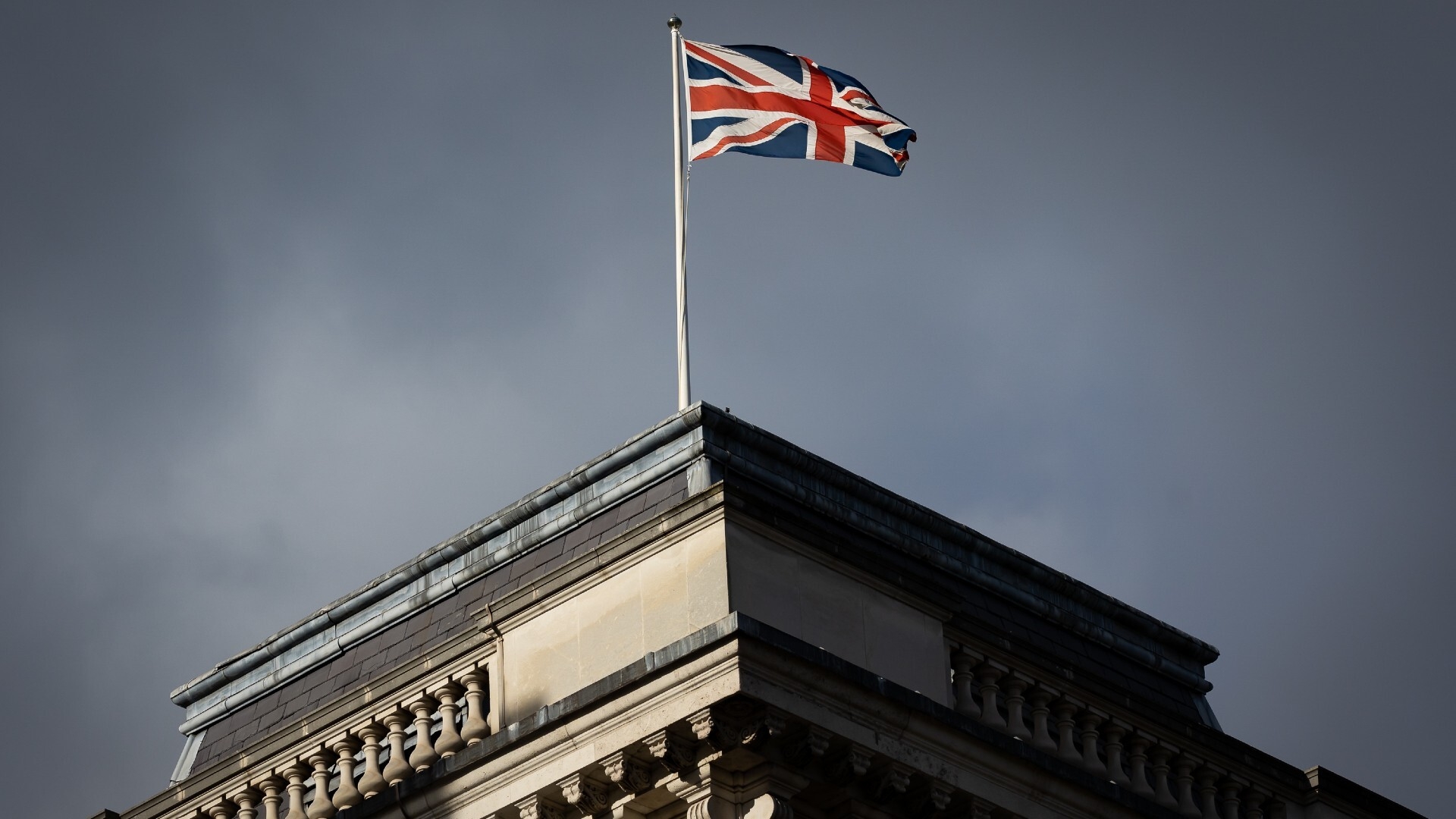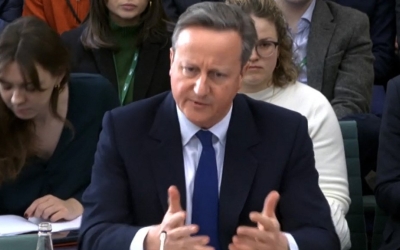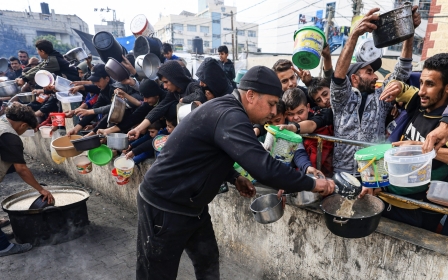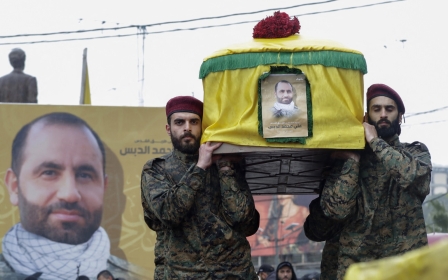UK's public position on Israel arms exports 'at odds' with internal reviews

The UK government is facing pressure from a coalition of rights groups to explain how it knows that British-made weapons have not been delivered to Israel since the 7 October attacks, Middle East Eye can exclusively reveal.
Scrutiny from the groups comes as Israel is poised to assault Rafah, where an estimated 1.5 million Palestinians have sought shelter, and days after UN experts warned that the transfer of weapons to Israel for use in Gaza is "likely to violate international humanitarian law" and must stop immediately.
The UK government has said that it has not provided lethal or military equipment to Israel since the Hamas-led attacks and subsequent Israeli assault on Gaza.
But in an affidavit filed at the High Court by the Department for Business and Trade in January, the government identified 28 current licences and 28 pending applications for the export of equipment "most likely to be used by the [Israeli army] in offensive operations in Gaza".
Items approved for export under the current licences included components for combat aircraft, armoured personnel carriers and targeting equipment, according to the government's assessment.
New MEE newsletter: Jerusalem Dispatch
Sign up to get the latest insights and analysis on Israel-Palestine, alongside Turkey Unpacked and other MEE newsletters
Eight rights groups, which all work on issues concerning the occupied Palestinian territories, say that the government's public position and what it has admitted in the court document are "at odds", and are demanding that the government clarify how it can be sure that weaponry licensed for export has not been transferred to Israel since 7 October.
"The government's publicly-stated position on weapon licences to Israel is difficult to reconcile with what the government had admitted in litigation," the groups say in a letter sent to the government on Wednesday.
'No information is collected by the government on what exports are actually transferred under any licence'
– Rights groups' letter
In particular, the groups which include Human Rights Watch, the Campaign Against the Arms Trade and Amnesty International UK, say they believe a licence for UK-made components for F-35 fighter jets, a combat aircraft which Israel has used to bomb Gaza since October, was "very likely" among those listed in the affidavit.
"No information is collected by the government on what exports are actually transferred under any licence," the letter says.
"This raises serious issues for transparency of information in the public interest and the question of how the government can be sure that there have been no deliveries since 7 October."
A Department for Business and Trade spokesperson said: “We take our defence export responsibilities extremely seriously and operate one of the most robust export licensing controls in the world."
The spokesperson said the situation in Israel and the occupied Palestinian territories was monitored closely.
“If licences were found to be no longer consistent with the UK Strategic Export Licensing Criteria, including if items might be used to commit or facilitate a serious violation of International Humanitarian Law, then those licences can be revoked, suspended or amended.”
The spokesperson did not comment on whether UK-made lethal or material equipment had been exported to Israel since 7 October.
'Mounting evidence'
Nearly 30,000 Palestinians have been killed in the Israeli offensive on Gaza, which followed the Hamas-led attacks that killed 1,200 Israelis on 7 October.
The organisations say they are "deeply concerned" that the UK government has not suspended arms transfers to Israel despite what they say is the clear risk that UK-made arms could be used to carry out violations of international humanitarian law in Gaza.
The government is obligated by its own criteria to suspend licences for arms exports under such conditions, but the groups say it is "flagrantly ignoring the mounting evidence of serious violations".

The UK's position, the groups say, is out of step with other countries, including the Netherlands, where a court this month ordered a halt to the export of F-35 fighter jet parts to Israel. The Dutch government has lodged an appeal against the judgment at the Dutch Supreme Court.
Foreign Secretary David Cameron told the Foreign Affairs Committee last month he was worried Israel might have breached international law, but that he had been given advice “consistent with the fact that we have not changed our export procedures”.
He did not say whether a formal review of UK arms exports to Israel had taken place.
The affidavit filed after Cameron's testimony and in its response to legal challenge brought by Palestinian human rights organisation Al-Haq shows that the Foreign Office had conducted at least three assessments of Israel's compliance with international humanitarian law between 10 November and 8 December.
Two assessments in November noted concerns over Israeli compliance, the court document shows. By 8 December, Foreign Office officials appear to have been satisfied on some counts after Israeli officials responded to a set of detailed questions they had asked.
But other points - including a lack of Israeli explanation about why food, water and medical supplies had been restricted in Gaza - still raised concerns. These, however, were attributed to different interpretations of law.
UK doctors caught in air strike
Cameron decided on 12 December that he was satisfied Israel was committed to complying with the law and advised Trade and Business Secretary Kemi Badenoch not to suspend export licences for UK arms sales to Israel, which she followed.
The groups pointed to a near-fatal air strike on four British doctors in Gaza this January, a month after Badenoch's decision to continue licensing arms exports, which they say should guide the UK government policy moving forward.
Around 6am on 18 January, the Israeli army used an F-16 jet to bomb the compound housing staff from the UK's Medical Aid for Palestinians (MAP) and the US-based International Rescue Committee (IRC) in the southern Gaza town of Al-Mawasi.
The strike left several people with non-life-threatening injuries and severely damaged the compound, which the Israeli military had told the UK a month earlier was marked as a protected humanitarian site.
A UN investigation into the attack found this month that Israeli forces "most likely" used a 1,000-pound bomb guided by a kit that turns "free fall" bombs into precision-guided missiles.
The investigation raised questions about whether weapons or components made in the UK and US had been used in the attack.
The US has sold or transferred both the type of bomb and kit likely used in the attack, and it has previously been acknowleged, after earlier Gaza wars, that F-16s used by Israel "almost certainly" contain UK-made components.
When asked by MEE, the UK and US governments would not say whether the incident had impacted weapons sales or transfers.
"This is at least one example when the UK government should have access to information to make an assessment of whether the air strike was a violation of international humanitarian law," the groups' letter said.
Middle East Eye delivers independent and unrivalled coverage and analysis of the Middle East, North Africa and beyond. To learn more about republishing this content and the associated fees, please fill out this form. More about MEE can be found here.




